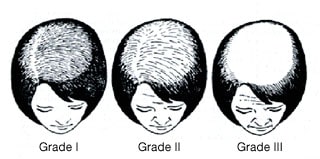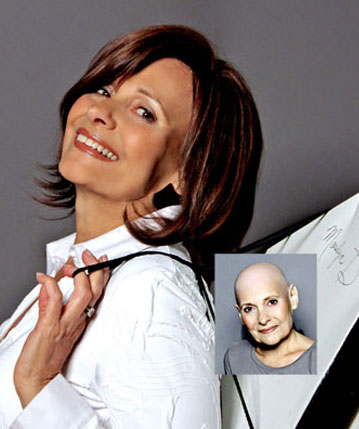THINNING HAIR HAS AN EMOTIONAL IMPACT, WE KNOW HOW TO HELP YOU
Women’s Hair Loss Causes & Treatment Options
Causes of Hair Loss in Women
The most common type of hair loss seen in women is androgenetic alopecia, also known as female pattern alopecia or baldness. This is seen as hair thinning predominantly over the top and sides of the head. It affects approximately one-third of all susceptible women but is most commonly seen after menopause, although it may begin as early as puberty. Normal hair fall is approximately 100-125 hairs per day. Fortunately, these hairs are replaced. True hair loss occurs when lost hairs are not regrown or when the daily hair shed exceeds 125 hairs. Genetically, hair loss can come from either parent’s side of the family.
 Female Hair Loss
Female Hair Loss
There are two different types of hair loss, medically known as anagen effluvium and Telogen effluvium. Anagen effluvium is generally due to internally administered medications, such as chemotherapy agents, that poison the growing hair follicle. Telogen effluvium is due to an increased number of hair follicles entering the resting stage.
The most common causes of telogen effluvium are:
- Physical stress: surgery, illness, anemia, rapid weight change.
- Emotional stress: mental illness, death of a family member.
- Thyroid abnormalities.
- Medications: High doses of Vitamin A, Blood pressure, and Gout medications.
- Hormonal causes: pregnancy, birth control pills, menopause.
- When the above causes of telogen effluvium are reversed or altered you should see the return of normal hair growth.
Diet Considerations
Hair loss may also occur due to dieting. Franchised diet programs that are designed or administered under the direction of a physician with prescribed meals, dietary supplements, and vitamin ingestion have become popular. Sometimes the client is told that vitamins are a necessary part of the program to prevent hair loss associated with dieting. From a dermatologist’s standpoint, however, the vitamins cannot prevent hair loss associated with rapid, significant weight loss. Furthermore, many of these supplements are high in vitamin A which can magnify hair loss.
Physical and Emotional Stress
Surgeries, severe illnesses, and emotional stress can cause hair loss. The body simply shuts down the production of hair during periods of stress since it is not necessary for survival and instead devotes its energies toward repairing vital body structures. In many cases, there is a three-month delay between the actual event and the onset of hair loss. Furthermore, there may be another three-month delay prior to the return of noticeable hair regrowth. This then means that the total hair loss and regrowth cycle can last 6 months or possibly longer when induced by physical or emotional stress. There are some health conditions that may go undetected that can contribute to hair loss. These include anemia or low blood count and thyroid abnormalities. Both of these conditions can be detected by a simple, inexpensive blood test.
Hormonal Considerations
Hormonal changes are a common cause of female hair loss. Many women do not realize that hair loss can occur after pregnancy or following the discontinuation of birth control pills. It is important to remember that hair loss may be delayed by three months following the hormonal change and another three months will be required for new growth to be fully achieved.
Myths Related to Hair Loss
- Frequent shampooing contributes to hair loss.
- Hats and wigs cause hair loss.
- 100 strokes of the hair brush daily will create healthier hair.
- Permanent hair loss is caused by perms, colors, and other cosmetic treatments.
- Women are expected to develop significant hair loss if they are healthy.
- Shaving one’s head will cause the hair to grow back thicker.
- Standing on one’s head will cause increased circulation and thereby stimulate hair growth!
- Dandruff causes permanent hair loss.
- There are cosmetic products that will cause the hair to grow thicker and faster.
- Stress causes permanent hair loss.
- Hair loss does not occur in the late teens or early twenties.
- Hair loss affects only intellectuals.
- There is a cure for androgenetic Alopecia.
These are only a few of the common myths heard by physicians and other hair loss specialists on a daily basis. The American Hair Loss Council suggests that you first have your hair loss diagnosed by a competent dermatologist who sees hair loss patients on a regular basis. Once you know the diagnosis you will have a better understanding of exactly which treatment option may be best for you.
Treatment Option Available for Female Pattern Hair Loss
Perms, color, and other cosmetic options give a fuller appearance to hair.
Medical Therapy – Rogaine (topical minoxidil). Rogaine is the only FDA-approved medication currently available for female pattern hair loss.
Hair Transplant Surgery – Modern surgical techniques have made transplantation for females a viable treatment option providing they are qualified candidates and have realistic expectations.
Hair Replacement Hair Systems — Modern forms of hair additions have also made recent improvements in simulating a natural appearance. A consultation with a skilled specialist to discuss your options is advised.
GET ANSWERS TO YOUR QUESTIONS
Hair loss and thinning hair can be emotionally traumatic and affect how you see yourself and how you react to others. For over 35 years, we have been helping men and women restore not only their hair, but also their confidence and their smile.
Whether you are experiencing thinning hair and want to stop your hair loss, or want more hair, we offer the latest clinically proven hair loss treatment and hair restoration solutions for men and women of all ages and hair types.
We want to help you find the hair loss solution that is right for you. Contact Steve Latham Hair Restoration Clinic in Huntsville today to schedule your free, private consultation.
Get Answers Today
RESTORE YOUR HAIR. RESTORE YOUR LIFE. Schedule a free, private consultation today.


